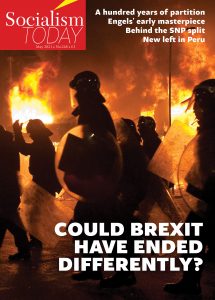
Boris Johnson’s withdrawal agreement with the European Union, which would “effectively leave Northern Ireland within the EU’s economic jurisdiction” following the UK’s exit, “will dangerously escalate sectarian tensions; spilling over into Britain too as in the past”, we warned before the December 2019 general election. (Socialism Today No.233, November 2019)
“For this reason alone”, we went on, after 19 mainly Blairite Labour MPs had voted with Johnson against the parliamentary whip issued by the then leader Jeremy Corbyn, “the workers’ movement in Britain can give no support to Johnson’s deal”.
The Socialist Party, the publishers of Socialism Today, opposes the EU, which at bottom is a bosses’ club attempting to co-ordinate the policies of different capitalist nation states on a continental scale in the interests of big business.
We backed a leave vote in the binary choice referendum on the UK’s EU membership in 2016 from the standpoint of working class socialist internationalism.
But that did not signify a commitment to offer even one ounce of support to the subsequent outcome of negotiations between the UK government and the 27 other EU member states on what the new relationships would be, including the so-called ‘Northern Ireland Protocol’.
Read more